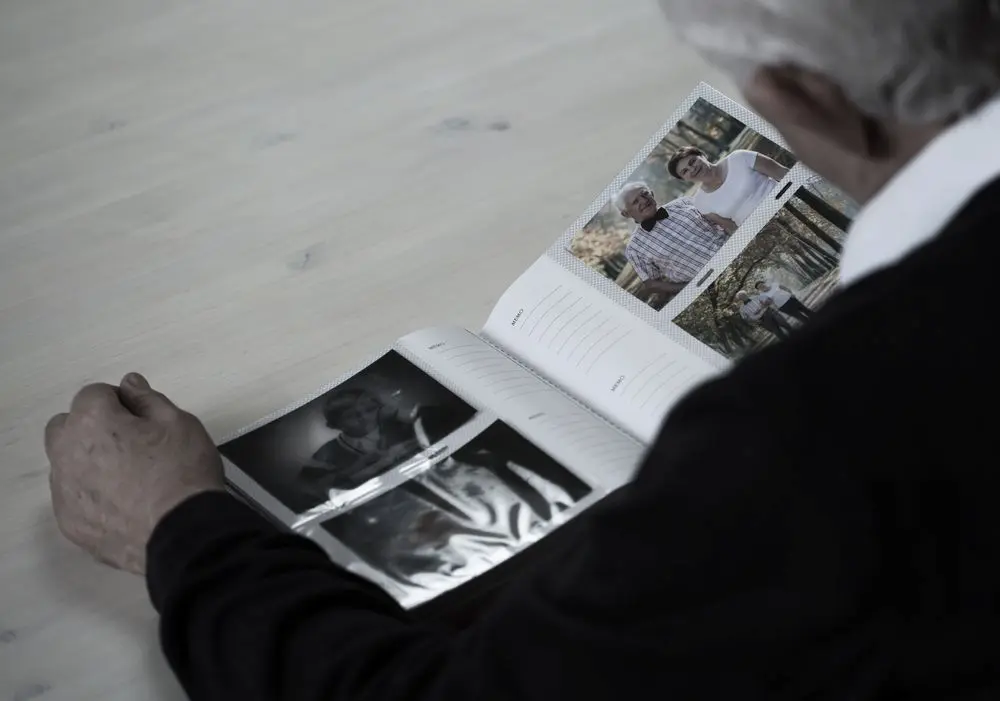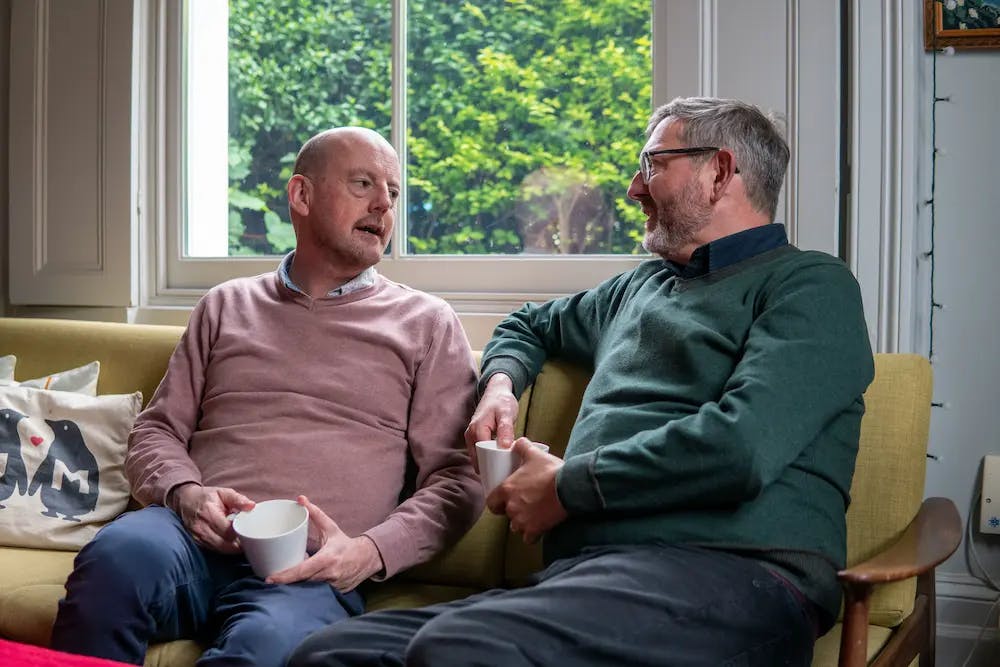9 Ways To Create a Dementia Friendly Christmas For Your Loved One

Estimated Reading Time: 8 minutes
Christmas is no doubt a magical time of year, but it can be tough for anyone living with dementia - including people in dementia care homes and those living at home. Losing a familiar routine, family visits and the pressure to have the perfect celebrations can quickly cause you and your loved one with dementia to feel overwhelmed.
With over 900,000 people living with dementia in the UK, more people than ever before are searching for dementia support in the run-up to Christmas.
Here, we’ve explored ways to lovingly care for someone with dementia at Christmas, along with different ways to have a dementia friendly Christmas - including dementia-friendly gifts!
Need to find dementia care fast?
Browse the best dementia care homes for your loved one.
Nine Ways to Have a Dementia-Friendly Christmas
1. Swap the TV for music
For some people living with dementia, watching the television can be difficult, as they may struggle with storylines. Create a dementia friendly Christmas by swapping out the TV for the radio – or by playing a specially-curated dementia-friendly playlist – as it can be easier to follow.
Music therapy is increasingly becoming a key part of dementia care as it can enhance your loved one’s life, enabling them to express themselves creatively while providing a shared experience for families.
2. Put any decorations up gradually
A change in routine and losing familiar surroundings can sometimes be tough for anyone living with dementia. Put your decorations up over a few days to ease your loved one into their new environment. This gradual approach can help them familiarise themselves at their own pace.
Scents can be a great way of evoking memories of the past – think about swapping some of your usual decorations for scented decorations. Oranges and spices could help them to reminisce.
Most importantly, don’t place any pressure on your loved one to think about the past. It should come naturally, in a calm and stress-free environment.
Avoid saying ‘remember when…’ to try and jog their memory. Instead, you can talk more openly about the past and lead the conversation. A more suitable and calm approach would be ‘I remember when…’, as this can ease them into an open conversation where they can join in if they feel comfortable.
3. Change your routine beforehand
Christmas Day is often the busiest day of the year! From unwrapping gifts to cooking food, it represents a huge change to our everyday routines. You don’t have to avoid your usual Christmas Day fun though. Communicating clearly and calmly will help with the transition to a new routine.
Firstly, introduce one new change every couple of days to smooth out the transition, rather than letting it happen all at once.
With each change, remember to talk about it before and after it happens. It’s not just a good idea to prepare your loved one ahead of the change, but also to review the change after it’s happened to keep in their mind this change has occurred. Doing this gradually will help create the sense of a new, familiar routine.
If your loved one is leaving familiar surroundings over Christmas, make sure this is clearly communicated beforehand. When you travel with your loved one, give yourself plenty of time, as this can ease any caregiver stress.
4. Be mindful of food
When plating up any Christmas food, be mindful that a full plate can be daunting, especially for those who have difficulties eating. Avoid overloading your loved one’s plate – and most importantly – don’t rush them. Keep calm and ensure they have enough time to eat.
Sharing your loved one’s festive food likes and dislikes with close friends and family members can really help tailor their meals. Remember, although people with dementia don’t need a special diet, elderly nutrition is important and you should still aim to serve things they’ll enjoy.
By understanding a person with dementia’s preferences, you can support them to eat and drink in a way they’ll enjoy.

5. Avoid talking differently
Although no harm is intended, sometimes you may find that you speak differently to your loved one with dementia. Speaking in a childlike tone can come across as patronising and demeaning, and may leave your loved one feeling irritated, overwhelmed or anxious.
Remember, your loved one deserves dignity and respect. Every person’s experience of dementia is unique, so make sure they feel as comfortable as possible. Communicate clearly and calmly, use simple sentences and take the time to listen to their response.
6. Buy dementia-friendly gifts
We've rounded up the best present ideas and dementia-friendly products for your loved one with dementia:
- Photo frames
- Low-maintenance plants
- Colouring and activity books
- A dementia radio (these are highly accessible, with a straightforward control panel, large buttons and colour contrast)
- Relaxation sets (such as scented candles, aromatherapy diffusers and fragranced wheat bags)
- Music players (to further help with reminiscence, much like through reminiscence therapy)
- Hobby subscription services (from micro-gardening subscription sets to craft kits and tasting subscriptions, the options here are nearly endless)
Or any other nostalgia-inducing items you can think of.

7. Spend time with your loved one at their care home
If your loved one is unable to leave their care home due to illness, a long-term condition or through personal choice, many care homes welcome family members to join residents on this most special of days. Often, you’ll be able to enjoy a delicious festive feast, while dedicated activity coordinators will organise traditional entertainment. Be sure to ring up beforehand to arrange your visit.
This is the case at Borough Care homes which are based in North West England. Here, family members are encouraged to pay their loved ones a visit on Christmas day, while their Activity and Lifestyle Facilitators (ALFs) will make sure everyone has an amazing time.
8. Writing and sending Christmas cards
If your loved one with dementia has always diligently sent out Christmas cards, they may want this to continue. Many care homes throughout the country encourage residents and their families to sit down and write cards together, in order to create a dementia friendly Christmas.
At Cawood House care home in Stockport, weekly art sessions see families and residents come together and get creative. A recent competition saw Cawood resident Norma Taylor’s artwork featured on the cover of Borough Care’s official company Christmas card - much to the joy of her fellow residents, her family members and all the staff at the home.
9. Create an amazing Christmas tree
Decorating a Christmas tree is an especially important Christmas tradition for many people, and dementia residents are no different. Often, family members are invited to their loved one’s care home, where they can get involved with creating a magical Christmas environment.
At Borough Care’s Shepley House care home in Stockport, families were invited to come and help put the care home’s Christmas trees up. Families were in each room decorating with the residents and listening to festive music. Everyone agreed it was a wonderful way to spend some special time together.
Thanks to Borough Care for providing us with some heartfelt stories about creating a dementia-friendly Christmas within their care homes.
Why Is Creating a Dementia-Friendly Christmas Important?
Our new research has found that over the last 12 months, online searches for terms relating to dementia friendly Christmas, dementia at Christmas and dementia Christmas activities have surged:
| Dementia Term | How Much Are People Searching For It? |
|---|---|
| ’Dementia friendly activities | + 86% |
| ’Dementia christmas gifts’ | + 50% |
Source: Internal analysis from Google Keyword Planner over the last 12 months (December 2021 to November 2022) – the full data set is available on request.
Creating a dementia-friendly Christmas is important as it allows everyone to enjoy the day and the festivities surrounding it. Research by the Alzheimer’s Society has shown that over 50% of people affected by dementia find Christmas to be the most isolating time of year. By creating a dementia-friendly Christmas, you can go a long way to removing these barriers and ensuring everyone has an amazing time.
Caring For Someone With Dementia at Christmas
Millions of families across the UK will have someone with dementia join their Christmas celebrations. Caring for someone with dementia can often be a challenging experience, but there’s no reason this should add any further pressure.
Christmas is an incredibly important time of year for everyone. It’s understandable to feel anxious about making sure everyone is happy – especially someone who has dementia – but there are lots of ways to make your festive fun dementia-friendly.
Often, the best part of your loved one’s day is spending time with you. Although it can be a challenge and feel overwhelming, it’s so important to spend time together. Feelings evoked from relaxing and having fun together can shape the rest of their day. Your family visits have more lasting power than you think and can influence how they feel.
Remember: even if it’s a slower pace than what you’re used to, you’re making memories together. It’s equally important to support yourself, as looking after someone with dementia can feel overwhelming. Open up to your close friends and family if you’re struggling, as doing this can prove to be a huge relief.
What Our Dementia Care Homes Offer
We offer a range of dementia care homes, many of which provide reminiscence therapy, round-the-clock care and an excellent standard of facilities and support.
When your loved one is in a dementia care home, you can feel comfortable in the knowledge that they're in a safe and compassionate place where needs are tended to on an individual basis and dementia-friendly activities are regularly offered.



